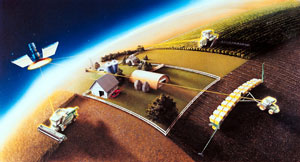A company that wants to create a new, integrated wireless broadband/satellite network is facing opposition from agricultural global positioning system (GPS) providers and users.
 As we reported on Precision Pays, Virginia-based company LightSquared
As we reported on Precision Pays, Virginia-based company LightSquared
has proposed to set up 40,000 wireless broad-band stations across the nation on a frequency that is right next to the one used by GPS. Opposition to the plan became organized in the form of the Coalition to Save Our GPS, which consists of a wide variety of industries and companies, including agricultural interests and technology providers such as New Holland, Deere, GROWMARK, Leica Geosystems and Trimble Navigation.
This week, the company announced a solution to the GPS interference issue by moving to a lower block of frequencies that is “largely free of interference issues with the exception of a limited number of high precision GPS receivers that are specifically designed to rely on LightSquared’s spectrum.”
Agricultural interests are concerned about that exception. A study released by the Coalition to Save Our GPS estimates that LightSquared’s plan could result in “direct economic costs of up to $96 billion to U.S. commercial GPS users and manufacturers.” Jim Kirkland, vice president and general counsel of Trimble, says the analysis “also highlights how LightSquared’s recently announced ‘solution’ to the interference problem, which LightSquared admits will not reduce interference for high precision GPS uses, is no solution at all. High precision GPS uses represent nearly $10 billion in historical investment by GPS users over the last five years and $30 billion in annual economic benefits.”
“The use of GPS technology is vital to thousands of people who make their living with agricultural and construction equipment. It is simply not acceptable to allow this new network to interfere with these important industries when all indications are that there is no practical solution to mitigate this interference,” said Ken Golden, director of global public relations at John Deere. “In agriculture, the loss of a stable GPS system could have an impact of anywhere from $14 to $30 billion each year. That could significantly erode the strong competitive global position of U.S. farmers in the world agricultural economy.”
Meanwhile, the 2012 agriculture appropriations bill recently passed by the House includes language specifically to register concerns about the LightSquared network and directs the USDA “to ensure the FCC is aware of these concerns.”

